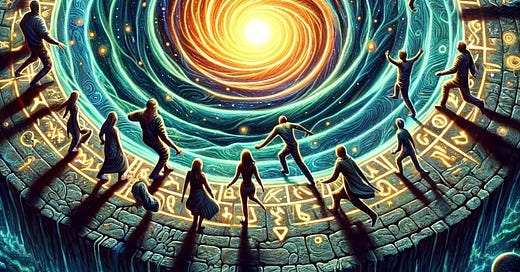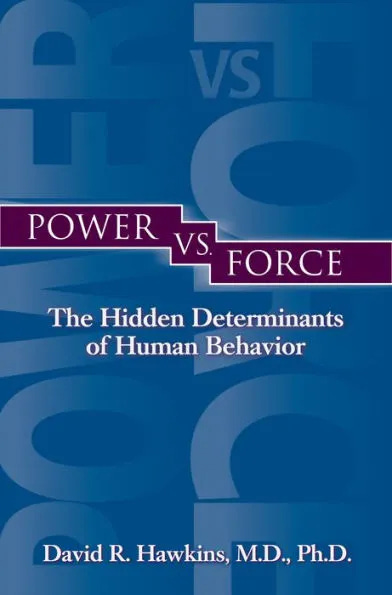An Invitation From Diamond-Michael Scott
“Great Books, Great Minds” is my full-time work and life passion, a labor of love fueled by the endless hours of work I put into researching and writing these feature pieces. So if you enjoy this digital newsletter, find it valuable, and savor world-class book experiences featuring epic authors and book evangelists, then please consider becoming a paid supporting member at $6.00 a month or $60.00/year.
I recently finished the book “Power vs Force: The Hidden Determinants of Human Behavior” by renowned psychiatrist and spiritual teacher Dr. David Hawkins. In it he presents an uncommon look at human consciousness and the dynamics of power by offering a construct that measures the levels of energy and consciousness in individuals and society.
Hawkins argues that power, which he defines as the ability to influence and create positive change, is far more effective and sustainable than force, which relies on coercion, manipulation, and fear. He explains that power is aligned with truth, integrity, and compassion, while force is driven by ego, control, and aggression.
The significance of "Power vs Force" for modern times lies in its potential to transform our understanding of personal and collective power. It encourages individuals to evaluate the motives and intentions behind their actions and to cultivate power through higher states of consciousness. By recognizing the limitations and destructiveness of force, Hawkins suggests that we can create a more harmonious and peaceful world.
Moreover, the book offers practical insights and techniques to raise one's consciousness, such as meditation, mindfulness, and self-reflection. It invites readers to become aware of their own energy, thoughts, and emotions, and to choose power over force in their interactions and decision-making.
In a time marked by conflicts, polarization, and power struggles, "Power vs Force" provides a valuable framework for understanding and navigating the complexities of human behavior. It invites us to shift our focus from external control to inner growth, fostering a more enlightened and compassionate approach to personal relationships, leadership, and societal change.
Below are some thoughtful questions about the book, along with answers that capture the essence of Hawkins' work:
What’s the central thesis of "Power vs. Force?”
The central thesis of the book is that there are two fundamental types of human interactions: power and force. Power is peaceful, self-affirming, and exists without resistance, while force is coercive and creates opposition and conflict. Hawkins introduces a scale of consciousness that ranges from shame to enlightenment, suggesting that true power arises from higher levels of consciousness.
How does Hawkins differentiate between "power" and "force"?
Hawkins suggests that force is exerted upon others and is always met with counterforce, leading to depletion of energy. Power, on the other hand, is natural, productive, and expansive. It does not involve exertion or resistance and instead stands on its own truth, influencing others without direct intervention.
What is the Map of Consciousness and how is it used in the book?
The Map of Consciousness is a conceptual scale that assigns calibrated numerical values to a range of emotions and attitudes, which correspond to different levels of consciousness. In the book, it is used to illustrate how individuals and societies can evolve from states of fear and anger to states of love, reason, and enlightenment. Each level of consciousness reflects a person's worldview and affects their actions and interactions.
Describe the concept of kinesiology as it relates to "Power vs. Force?”
Kinesiology, in the context of Hawkins' work, refers to muscle testing as a method of gauging the body's response to various stimuli, which Hawkins correlates with the levels of consciousness on his Map. He proposes that the human body inherently responds to truth and consciousness levels, becoming stronger or weaker, which can be measured through this technique.
How does "Power vs. Force" suggest one can progress to higher levels of consciousness?
The book encourages self-awareness, honesty, and the pursuit of truth. It suggests that by understanding where one currently falls on the Map of Consciousness, individuals can aspire to reach higher states by cultivating attributes associated with those levels, such as integrity, compassion, and forgiveness.
What sort of criticisms have been leveled against the methods and claims in "Power vs. Force?”
Critics have questioned the scientific validity of muscle testing, arguing that it is susceptible to bias and lacks empirical evidence. Additionally, some have found Hawkins' Map of Consciousness to be subjective, pointing out that the assignment of numerical values to emotional states and the claim that one can calibrate "truth" are not grounded in established scientific methodologies.
The book, while controversial, has been influential in the fields of spirituality and self-help, inviting readers to explore the interplay between subjective experiences and a universal quest for growth and understanding.







I have this book in a box somewhere. I started it years ago, but I'm not sure I finished it. Maybe it's time to dig it back out...
Dear sir, can u recommend me a book for learning history? Special incidents, events, wars, aftermath of wars, new world order, new institutions emerged after war etc must be there too.
I read some books but didn’t enjoy them.